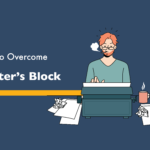Learning anything takes time, patience, and a whole lot of trial and error. Writing is no different.
At first, writing might feel like trying to build a house with your bare hands. You have ideas, but shaping them into something solid takes more than just enthusiasm.
Thankfully, writing, like any skill, can be learned, improved, and mastered with the right approach.
You don’t need to be born with some “rare literary gift” or wait for inspiration to strike. You only need consistency, a willingness to improve, and a clear path forward.
This guide is that path. It will walk you through 10 practical steps to help you develop the mindset, habits, and skills of a professional writer.
Let’s get right to it.
1. Become a better reader
You can’t be a great writer if you’re not an avid reader. No, it’s not a cliché—it’s a fundamental truth.
In On Writing, Stephen King famously says, “If you don’t have time to read, you don’t have the time or the tools to write.”
And he’s right.
Reading is how you internalize good writing. It fuels your creativity, expands your vocabulary, and teaches you how words can be used to inform, persuade, and captivate.
But passive reading isn’t enough. To grow as a writer, you need to read like a writer. That means paying close attention to the mechanics behind the words.
- How does an author build tension?
- What makes their prose flow effortlessly?
- Why does one sentence hit hard while another falls flat?
The more you absorb and dissect great writing, the more refined your writing will become.
Also, don’t just stick to one genre. Read fiction, nonfiction, essays, journals, poems, technical manuals, and even advertising copy. Each one teaches you something different.
2. Develop a professional writing routine
To become a professional writer, you cannot base your growth on wishful thinking.
Many skilled writers you admire didn’t get there by waiting for inspiration to strike. They built a habit of writing consistently, whether they felt like it or not.
Want to become a pro? Set a writing schedule that works for you. It can be early in the morning, during lunch breaks, or late at night. Whichever it is, commit to writing consistently.
If the idea of daily writing feels overwhelming, start small. Commit to 500 words a day. Once that becomes second nature, push yourself further.
Increase your word count, extend your writing sessions, or challenge yourself with different types of writing.
The goal is to train your brain to enter “writing mode” without hesitation, and the more you practice, the easier it gets.
Over time, writing will be as natural as breathing. And that’s when you’ll start making real progress toward becoming a professional writer.
3. Pick a niche
While versatility is valuable, specializing in a niche helps you grow faster, build credibility, and stand out in a crowded field.
Think about what you genuinely enjoy writing about.
Do you love crafting compelling stories? Fiction, scriptwriting, or even game writing could be your lane.
Are you fascinated by technology? Technical writing, software documentation, or cybersecurity content might be a great fit.
If marketing excites you, content writing, copywriting, and SEO-focused writing could be your thing.
Besides, your niche can also be the type of writing you do. Some writers focus on long-form articles, while others specialize in ad copy, white papers, or product descriptions.
The clearer you are about your expertise, the easier it is to attract the right clients and opportunities.
That said, having a niche doesn’t mean you’ll never write outside it. You can, if you want to.
Many professional writers branch out over time, especially as they gain experience. However, having a primary focus makes it easier to market yourself and develop deep expertise that clients or employers will value.
4. Take writing courses
You may have a natural talent for writing. That’s great, but talent alone isn’t enough.
To become a professional writer, you must refine your skills and learn to adapt to different formats and audiences.
Writing courses can help you develop the necessary skills much faster than riding solo.
These courses—whether online or in-person—teach essential techniques like structuring content, improving grammar, mastering storytelling, and adapting to industry-specific standards.
Platforms like Coursera and Udemy offer courses on everything from creative writing to technical and business writing. And many of them are self-paced, making it easy to fit them into your schedule.
Even better, many universities, like Harvard, provide free online writing courses, giving students access to expert-level teachings without the cost.
Beyond formal courses, writing workshops and critique groups are invaluable. They expose you to feedback from other writers, help you spot weaknesses in your work, and push you to improve through constructive criticism.
The fastest way to grow as a writer is to learn from others and apply what you learn, so take advantage of every opportunity.
5. Develop your voice
Your voice stands out in how you phrase sentences, structure arguments, and infuse personality into your work.
Think of it as your writing fingerprint—the unique way you tell stories that’s distinctly you.
Some writers are sharp and direct, while others are poetic and reflective. Some are sarcastic, while others are warm and inviting.
Finding your voice takes time, but the best way to develop it is to write consistently, mimic your favorite writers, and experiment with different styles.
Pay attention to what feels natural versus forced. If a specific tone or rhythm makes writing easier, lean into it.
Even the most distinctive authors have influences. Stephen King openly credits H.P. Lovecraft for shaping his storytelling, yet his voice is unmistakably his own.
Ray Bradbury admired Ernest Hemingway’s brevity but crafted a lyrical voice that no one else could replicate.
I personally don’t have a single writer who influences me (at least, not yet). Instead, I pick up bits and pieces from everything I read, sometimes without realizing it.
The key is to absorb what works, discard what doesn’t, and let your instincts refine the rest.
The more you write, the more your voice will emerge. And once you find it, it becomes your biggest asset.
6. Build a strong portfolio
Truthfully, no matter how skilled you are, it’s meaningless without proof of your work. Clients and editors cannot trust that you can deliver without a portfolio.
A portfolio is your writing resume. It should showcase your best work and prove that you can write effectively in your chosen field.
If you’re just starting, don’t wait for paid opportunities to build it. Grow your audience using free platforms.
Start by publishing pieces on Medium, your blog, or industry-relevant platforms. This gives you public samples to point to when pitching for gigs.
If you’re pursuing journalism, contribute guest articles to online magazines, even if they’re initially unpaid (volunteer roles).
For copywriters, sample ads, landing pages, or blog posts can demonstrate your ability to craft compelling content. You don’t need a client to create these; pick a brand, write a mock campaign, and add it to your portfolio.
Most importantly, keep your portfolio organized and easy to access.
A personal website is ideal, but a well-structured Google Drive folder or a profile on platforms like Contently can work, too.
Make it simple for potential clients or employers to see what you can do.
7. Seek feedback
Feedback is essential to your growth as a writer. You can’t improve in a vacuum.
You might think your writing is brilliant until someone else reads it and exposes the weak areas. And as a growing professional, an editor should be your best friend (even when they’re “ruthless”).
Where do you get this feedback? From critique groups, writing workshops, or trusted readers.
You must surround yourself with people who will challenge you, not just praise everything you write.
Be open to feedback, especially when it stings. Even the best writers rely on editors to catch weak points in their work.
Instead of seeing critiques as an attack, view them as a roadmap to improvement. If multiple people point out the same issue, it’s probably worth revisiting.
At the same time, learn to separate personal feelings from professional growth. Your writing isn’t an extension of your identity; it’s a craft that can always be refined.
So, listen carefully, analyze the feedback, and apply what makes sense. That’s how you grow from an aspiring writer to a professional one.
8. Level up your technical knowledge
To make a living as a writer, you need to get comfortable with the tools and platforms that professionals use.
Start with basic word processors like Microsoft Word and Google Docs. Learn how to format documents properly, use headings, track changes, and export files in different formats.
If you’re writing for the web, familiarize yourself with content management systems (CMS) like WordPress since many clients and publications expect writers to upload and format their own articles.
Next, understand the technical aspects of writing for different mediums. If you’re in blogging or digital marketing, learn about SEO—how keywords, meta descriptions, and structured formatting impact search rankings.
You should also know how to use tools like Google Analytics, SEMRush, and Ahrefs to find keywords and analyze competitors.
Beyond that, take advantage of AI-powered tools to streamline your workflow. Platforms like Undetectable AI, Grammarly, and ProWritingAid can refine and humanize your content, ensuring your work remains authentic while benefiting from automation.
9. Gain industry experience
You need industry experience to establish yourself as a professional writer.
For starters, look for internships, freelance gigs, or guest blogging opportunities. They’ll give you clips for your portfolio, teach you how to meet deadlines, follow editorial guidelines, and adapt your writing to different audiences.
You can also try writing for local publications, company blogs, or even ghostwriting for others. Many businesses need content but don’t have in-house writers, so there’s always an opportunity to step in and provide value.
Also, freelance platforms like Upwork and Fiverr can help you land your first paid projects, but you shouldn’t stop there.
As you gain experience, focus on building direct relationships with editors and businesses. Pitch article ideas to websites in your niche, connect with industry professionals on LinkedIn, and follow up with past clients for repeat work.
The more bylines you collect, the more legitimate you look to future clients and employers.
Moreover, don’t underestimate the power of personal projects. Start a blog, contribute to Medium, or create in-depth LinkedIn posts.
When people Google your name, they should find proof that you can write.

Learn how to build an audience and gain readers without actually paying for a professional portfolio
10. Network with other professional writers
Start by joining writing groups, both online and in-person.
Facebook has active freelancer communities, LinkedIn has groups dedicated to content and copywriting, and platforms like Reddit and Discord offer real-time discussions with fellow writers.
Ask questions, share your experiences, and contribute to discussions in these spaces.
Also, events like writers’ meetups, publishing fairs, or content marketing summits give you direct access to professionals who are already where you want to be.
Make a point to introduce yourself, exchange contacts, and follow up after the event. A simple conversation can turn into a mentorship or collaboration opportunity.
Don’t underestimate the power of social media. Many writers and editors are active on Twitter and LinkedIn, engaging in conversations about industry trends, freelancing tips, and writing challenges.
Follow key figures in your niche, comment thoughtfully on their posts, and share your insights. It’s a slow journey, but it pays off.
In essence, when you surround yourself with people who understand the industry, you’ll grow and stay motivated and informed about new trends and opportunities.
RoninPoint Services: Your Partner in Writing Success
Becoming a professional writer takes time, but the key is to start. Read more, write consistently, and take courses to sharpen your skills.
Improve your grammar, style, formatting, and SEO knowledge (if you’re writing online). Publish, pitch, and seek feedback from those who can help you grow.
But don’t go on this journey alone. Connect with other writers and embrace constructive criticism.
At RoninPoint Services, our editors will eliminate errors, refine your writing, and enhance your message for maximum impact.
Need a second pair of eyes on your work? We can help—send us a quick email to get started.
Who wrote this?
Joanna is a versatile content writer with a knack for creating helpful content that resonates with others. When she’s not typing away, she finds solace in quiet moments, music, and cinematography videos. She believes she has an untapped well of creativity inside her and she’s willing to dig deep to fetch it out.
- Joanna Alihttps://roninpoint.com/author/joanna/
- Joanna Alihttps://roninpoint.com/author/joanna/
- Joanna Alihttps://roninpoint.com/author/joanna/April 20, 2025
- Joanna Alihttps://roninpoint.com/author/joanna/









